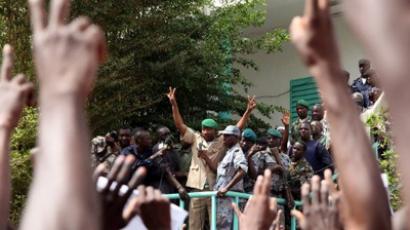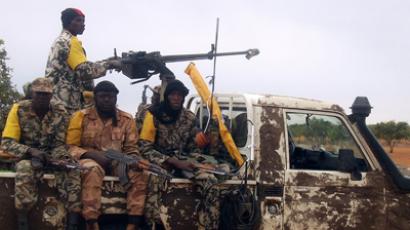French troops retake central Malian strongholds in push for 'total reconquest'
French troops retake the central Malian towns of Diabaly and Douentza after Defense Minister Jean-Yves Le Drian declares that France's ultimate goal is the “total reconquest” of Mali.
Early Monday morning, French and Malian troops entered the frontline towns of Diabaly and Douentza to little or no resistance. Residents said that rebels occupying the towns had abandoned them on the eve of France's advance. In Douentza the advance was preceded by air strikes. The recent push came amid news that militants were beginning to abandon their positions to regroup in the northern mountainous region of Kidal, 1,500 kilometers from the French and African forces’ arrival point in Bamako.A French commander, identified only as ‘Colonel Frederic,’ warned that the conflict in Mali may continue for some time. Diabily had recently been subjected to French air strikes as it was a base for the majority of Malian rebels south of the towns of Mopti and Sevare. The “situation in the vicinity of Diabaly was confused for the moment,” Colonel Frederic said, adding that more information was needed to estimate the length of time it would take to resolve the conflict.
Despite the apparently easy victory, French troops in Diabaly and Douentza remain on alert – the extremists are adept at blending in with local populations. Additionally, explosives may remain at the scenes of previous fighting. “There are risks of mines and booby traps in houses, that is why we have to be careful,” Malian army Colonel Seydou Sogoba explained. Colonel Fredric reiterated the “risks of mines and booby traps in houses.”On Sunday, 400 troops from Nigeria, Togo and Benin had arrived in the southwestern town of Bamako, near the Guinean border. France has deployed 2,000 ground troops in the country, and has been conducting air strikes on militant bases over the last 10 days. French troops aim to reclaim the country from Al-Qaeda in the Islamic Maghreb-linked rebels, who have imposed Sharia law in northern Mali.The news comes a day after France Defense Minister Jean-Yves Le Drian said that the goal of France's military action in the African country was to retake control of the entire country from Islamist militants, who have seized the north.
"The goal is the total reconquest of Mali. We will not leave any pockets [of resistance]," Le Drian told France 5 television on Sunday. Earlier, the French authorities said their operation in Mali would be just "a matter of weeks". According to unofficial accounts, over 100 militants have been killed since France began 'Operation Serval' in the west African country. Defense Minister Le Drian also said Sunday that he was not aware of any civilian casualties. Catherine Ashton, the EU's high representative for foreign affairs, told Reuters on Monday that the European Union had proposed a February 5th meeting in Brussels to discuss the ongoing crisis in Mali. The conference will be organized alongside the African Union, the Economic Community of West African States (ECOWAS) and the UN.
‘West has been moving to increase its control over Africa for many years’
The fight against terrorism in North Africa would go on for "even decades", UK PM David Cameron said on Sunday.UK is already helping France by providing logistical air assistance, as Britain lent France the use of two C-17 military transport planes. "We'll be looking at other transport and surveillance assets that we can let the French use to help them in what they are doing," Cameron told the British Parliament on Monday.
Former British Ambassador to Algeria Graham Hand assured RT, that Britain only wants to maintain stability in the region and globally. “I think Britain’s interest is in having stability on the, if you like, the southern flank of NATO, just across the Mediterranean from Western Europe. I don’t accept these conspiracy theories about minerals. I think it’s really about knowing that we have stable neighbors,” Hand told RT.He links the volatile situation in the African country to Al-Qaeda in Syria insurgency. “This is a foreign intervention by the Al-Qaeda-linked terrorist themselves. This is not honest Mali, that was trying to change the government,” added the former ambassador.
However, director of studies at the Institute of democracy and co-operation in Paris John Laughland believes, that the recent actions in Mali is a ‘general trend of intervention of Africa’.
“It’s no secret that the west, in general, has been moving to increase its control over Africa now for many years, for the last decade,” Laughland told RT.
He also claims that the US also has big geo-political interests on the continent and unlike Graham Hand says that minerals count.
“The Americans meanwhile have plans for the military as it were domination in Africa. They’ve drawn up plans for Africa to be put under a new section of the Pentagon to be controlled that way. So, whether there is a specific short-term goal of gaining control of natural resources (I can’t say, I am not well enough informed to know that), but I think we can identify a general trend of intervention of Africa, of increased western, including American, intervention in Africa, which this latest adventuring Mali is only the latest example,” added Laughland.Laughland slammed the west for using ‘double standards’ when it comes to the countries it’s interested in: “Why did the west support last year the secession of south Sudan, but suddenly it send in troops to prevent the secession of north Mali?’ he said.“These are political decisions. We are taking political decisions on the basis on our political vision on our friends and enemies. And that’s the reason why we [the west] do one thing in Syria and the other thing in Mali… We have practically the whole Middle East, including North Africa, in turmoil”, Laughland said to RT.














